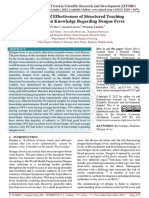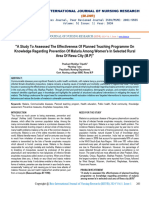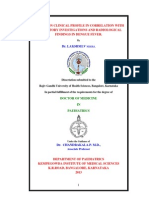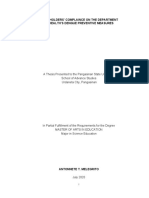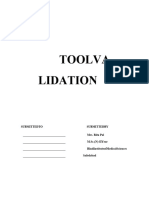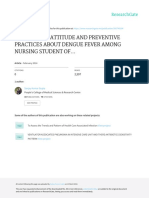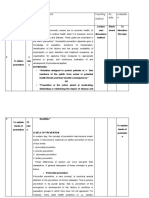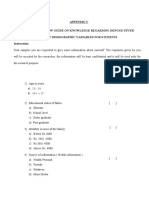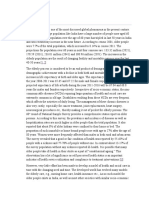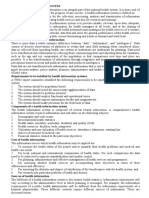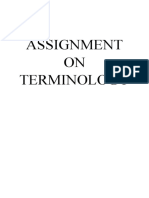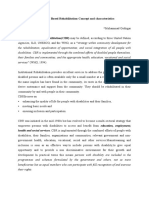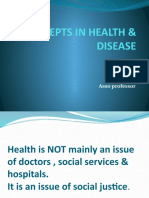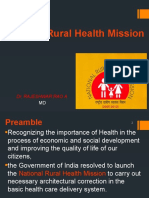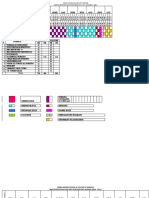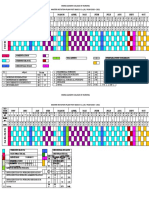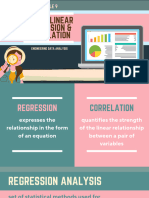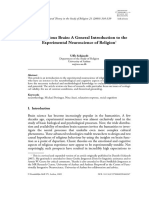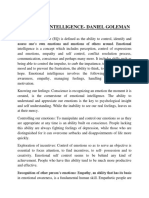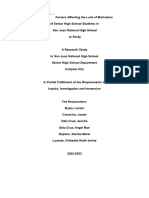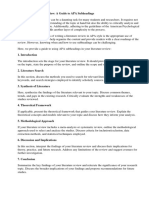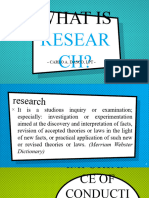“A STUDY TO ASSESS THE EFFECTIVENESS OF PLANNED HEALTH
TEACHING ON KNOWLEDGE REGARDING DENGUE FEVER
AMONG THE STUDENTS OF X STANDARD
IN SELECTED GOVERNMENTSCHOOL,
GONDA, UTTAR PRADESH.”
BY
Mrs. Annapurna Tiwari
Dissertation Submitted to the
Dr. Ram Manohar Lohia Avadh University, Ayodhya, U.P.
In partial fulfilment of the requirements for the degree of
Master of Science in Nursing
In
Medical Surgical Nursing
Under the guidance of
Dr.Aspin R. PhD
Associate professor
Medical Surgical Nursing
SCPM College of Nursing and Paramedical Sciences
Lucknow road, Haripur, Gonda U.P. – 271003
2021
DR. RAM MANOHAR LOHIA AVADH UNIVERSITY, AYODHYA, U.P.
i
� DECLARATION BY THE CANDIDATE
I hereby declare that this dissertation/thesis entitled “A Study To Assess The
Effectiveness Of Planned Health Teaching On Knowledge Regarding Dengue Fever
Among The Students Of X Standard In Selected Government School, Gonda, Uttar
Pradesh.” is a bonafide and genuine research work carried out by me under the guidance of
Dr.Aspin R. PhD, Associate professor, Department of Medical Surgical Nursing.
Date: Signature of the Candidate
Place: Gonda Mrs. Annapurna Tiwari
ii
� CERTIFICATE BY THE GUIDE
This is to certify that the dissertation entitled “A Study To Assess The Effectiveness
Of Planned Health Teaching On Knowledge Regarding Dengue Fever Among The
Students Of X Standard In Selected Government School, Gonda, Uttar Pradesh.” is a
bonafide research work done by Mrs. Annapurna Tiwari in partial fulfillment of the
requirement for the degree of Master of Science in Medical Surgical Nursing.
Date: Signature of the Guide
Place: Gonda Dr.Aspin R. PhD
Associate professor,
Department of Mental Health Nursing,
SCPM College of Nursing and Paramedical
Sciences.
iii
� ENDORSEMENT BY THE HOD, PRINCIPAL/HEAD OF THE
INSTITUTION
This is to certify that the dissertation entitled “A Study To Assess The Effectiveness Of
Planned Health Teaching On Knowledge Regarding Dengue Fever Among The Students
Of X Standard In Selected Government School, Gonda, Uttar Pradesh.” is a bonafide
research work done by Mrs. Annapurna Tiwari, under the guidance of Dr.Aspin R.
PhD, Associate professor, Department of Medical Surgical Nursing.
Seal & Signature of the HOD Seal & Signature of the Principal
Dr.Aspin R. PhD, Mrs.Manimegalai.M M.Sc. Nsg
Associate professor, Principal,
Department of Mental Health Nursing, SCPM College of Nursing and
SCPM College of Nursing and Paramedical Sciences.
Paramedical Sciences.
Date: Date:
Place: Gonda Place: Gonda
iv
� COPYRIGHT
Declaration by the Candidate
I hereby declare that the Dr. Ram Manohar Lohia Avadh University,
Ayodhya, U.P., shall have the rights to preserve, use and disseminate this dissertation /
thesis in print or electronic format for academic / research purpose.
Date: Signature of the Candidate
Place: Name
© Dr. Ram Manohar Lohia Avadh University, Ayodhya, U.P.
v
� ACKNOWLEDGMENT
“When you can stop, you don't want to. And when you want to stop, you can't. That's
addiction "
-HealthyPlace.com
This thesis is the result of two years of work whereby I have been
accompanied and supported by many people. It is a pleasant aspect, that I now have
the opportunity to express my gratitude for all of them.
I am grateful to Almighty God for his grace and blessings, which has been the
guiding force behind all my efforts that has enabled me to complete this study
successfully.
I extend my sincere gratitude to the Management of SCPM College of
Nursing, the Chairman Dr. O.N. Pandey Sir and Managing Director Mrs. Alka
Pandey Mam, The Director Mr. Ajitabh Dubey Sir and Administrator
Mr.Dheeraj Kumar Dubey Sir for giving me a platform to complete my study
efficiently.
I express my profound respect and deep gratitude to Mrs.Manimegalai.M
M.Sc. Nsg Principal of SCPM College of Nursing for her support, valuable
suggestions and guidance to carry out the study.
I wish to express my heartfelt thanks to my esteemed guide and mentor
Dr.Aspin R. PhD Associate professor, Department of Mental Health Nursing, for
providing me with constant support, concern, un-tiring effort, continuous inspiration
and encouragement for this endeavor.
I extend my sincere thanks to Faculty Members of Department of Mental
Health (Psychiatric) Nursing and all the faculty of SCPM College of Nursing and
vi
� Paramedical Sciences for their guidance and helpful support during the entire course
of the study.
I am highly obliged to all the experts who validated the data collection tool
and gave their valuable suggestions in preparing the final draft for this study.
My heartfelt thanks to Librarian and Mr. Durgesh Srivastav, Computer
operator, SCPM College of Nursing & Paramedical Sciences, Haripur, Gonda for
there help and assistance rendered during the course of study.
I thank my parents and my friends who stood as pillar of support throughout
the study time. I extend my sincere gratitude to all members of the research
committee, for their valuable criticisms and suggestions for the improvement of this
dissertation.
The perfection of work finds success through teamwork and dedication which
are molded by various persons involved in the successful completion of this study. It
will not be fruitful, unless I extend my heartfelt thanks and gratitude to all who guided
me efficiently to bring this thesis forward.
Thank you all
With a grateful heart
signature of the Candidate
Date:
Place: Gonda (Mrs. Annapurna Tiwar)
vii
� LIST OF ABBREVIATIONS USED
Df Degree of freedom
H Hypothesis
HOD Head of the department
NS Non-Significant
P table value of chi-square test
S Significant
S. No. Serial Number
SD Standard Deviation
viii
� RESEARCH ABSTRACT
Background: We are familiar with the following statements:”Mosquitoes are worse than
Tigers”and It’s very difficult to control Dengue fever until it subside dengue fever has been
main health problem of the world. This study assesses the effectiveness of structured teaching
programme on knowledge o n Dengue fever among students in government school, Gonda.
OBJECTIVES: 1) To assess the pre test knowledge on Dengue fever, 2) to deliver the
structured teaching programme regarding Dengue fever, 3) to assess the post test knowledge
on Dengue fever, 4) to evaluate the effectiveness of structured teaching programme on
knowledge on Dengue fever. 5) to find out the association between post test scores of
knowledge demographic variables. METHOOLOGY: The study was conducted in
government school, Gonda. The research design used for this study was one group pre test
post test. 50 samples were selected through convenience sampling technique. A structured
interview questionnaire was used to collect the data on knowledge o n Dengue fever among
students for pre test followed by that structured teaching programme on f Dengue fever has
been given. Post test was conducted after an interval of one week by using the same
questionnaire. The data was analyzed by using descriptive and inferential statistics.
FINIDINGS: The demographic variables associated on the basis of knowledge are age
(8.73>7.82) Educational status (9.52>7.82), Income (8.08>7, 82), Source of information
(10.72>7.82), Type of solid waste disposal (8.39>7.82) and the demographic variables
associated on the basis of practice are income (11.48>7.82),Source of information
(11.0>7.82), type of solid waste disposal (8.76>7.82) on Dengue fever. Pretest knowledge
level was assessed among Housewive, mean was 12.14, standard deviation 3.4 and the overall
knowledge of mean percentage was 40% that shows the students were in inadequate
knowledge. Post test knowledge score in mean 19.9 and standard deviation 2.81. The overall
knowledge of mean percentage was 66% that shows adequate knowledge after structured
ix
�teaching programme., area wise calculation of knowledge level was assessed. The post test
mean percentage for definition of Dengue fever 73%, causes of Dengue fever was 63%,
mode of transmission of Dengue fever was 65%, signs& symptoms of Dengue fever was
65%, complication of Dengue fever was 48%, and prevention of Dengue fever was
70%.Comparison of pre and post test level of knowledge was analyzed by using paired’t test.
Calculated ‘t’ value was 14.8 (14.8>2.02) which was greater than table value. So it was
significant at p>0.05level. Comparison of pre and posttest level of knowledge in area wise
also analyzed by using paired’t test.Calculated‘t value for definition of Dengue fever
7.7>2.02, causes 14.6>2.02, mode of transmission 9.8>2.02, signs& symptoms 8.6>2.02,
complication 4.0>2.02 and prevention of Dengue fever 6.0>2.02. Hence all the areas of
knowledge were greater than the table value. So it was significant at p>0.05 level. Comparison
of pre and post test level of practice was analyzed by using paired t test. Calculated‘t’ value
was 16.2 (16.2>2.02) which was greater than table value. So it was significant at p>0.05level.
The calculated r value was higher than the table value. Hence it was a positive correlation
between knowledge so knowledge of the disease reported a significant higher on Dengue
fever. Conclusion: The study proves that structured teaching programme on dengue fever
among students was effective in improving the knowledge.
x
� TABLE OF CONTENTS
PAGE
CHAPTER CONTENT
NO
I INTRODUCTION 1 -11
Need for the study 3
Statement of the problem
6
Objectives of the study
Operational definitions 6
Assumptions 6
Hypothesis
8
Ethical consideration
Delimitation 8
Conceptual frame work 8
II REVIEW OF LITERATURE
12-28
Literature related to prevalence and
12
causes of Dengue fever.
Literature related to signs and symptoms 17
of Dengue fever.
Literature related to prevention of Dengue
fever. 19
Literature related to knowledge and
practice of Dengue fever. 22
xi
�III RESEARCH METHODOLOGY 29-35
Introduction 29
Research approach
Research design 29
Variables 29
Setting of the study
29
Population
Sample size and sampling technique 30
Criteria for sample selection 30
Development of the tool
Content validity 31
Reliability 31
Pilot study
Data collection procedure 31
32
33
33
34
IV DATA ANALYSIS 37-61
Data regarding the demographic variables 38
of students 41
Analysis of pre test and post test level of
knowledge score on Dengue fever
43
Comparison of mean pre test and post test
knowledge score on Dengue fever
Comparison of mean pre test and post test 45
area wise knowledge score on Dengue fever 54
xii
� Association between post test level of 60
knowledge score on Dengue fever among
students with their demographic variables
V DISCUSSION 62-67
SUMMARY, IMPLICATIONS,
VI CONCLUSION, RECOMMENDATION 68-74
AND LIMITATION.
BIBLIOGRAPHY 75
APPENDICES
xiii
� LIST OF TABLES
TABLE PAGE
TITLE
NO NO
Frequency &distribution according to demographic
1. Variables 38
Analysis between pre test and post test level of
2. knowledge score on dengue fever among students 41
Comparison of Mean, standard deviation and‘t’
test value of pre test and post test over all
.3 43
knowledge score o n Dengue fever among students.
Comparison of Mean, standard deviation and‘t’ test
4. scores of students in pre and post test 45
knowledge regarding definition of Dengue fever
Comparison of Mean, standard deviation and‘t’ test
5. scores of students in pre and post test 46
knowledge regarding causes of Dengue fever
Mean, standard deviation and‘t’ test scores of in
6. pre and post test knowledge regarding mode of 47
transmission of Dengue fever
Comparison of Mean, standard deviation and‘t’ test
scores of students in pre and post test
7. 48
knowledge regarding signs and symptoms of
Dengue fever
Comparison of Mean, standard deviation and‘t’ test
8. scores in pre and post test knowledge regarding 49
complication of Dengue fever among students.
Comparison of Mean, standard deviation and‘t’ test
9. scores in pre and post test knowledge regarding 50
prevention of Dengue fever among students.
Analysis between pre test and post test level of
10. practice score regarding control and prevention of 52
dengue fever among students
Association between post test overall knowledge
11. scores of samples with demographic Variables 54
xiv
� LIST OF FIGURES
FIG. PAGE
TITLE
NO NO
Conceptual framework based on Rosen stock's(1974),
Health Belief Model applied to assess the effectiveness
1. of s t r u c t u r e d teaching programme on knowledge on 11
dengue fever among students.
2. Schematic representation of the Research design 36
Bar diagram shows percentage of pre- test and post-
3. test knowledge score on dengue fever among Students. 42
Bar diagram shows mean percentage of pre-test and
4. post-test over all knowledge score on dengue 44
fever among students.
Bar diagram shows mean percentage of pre- test and
post- test knowledge score of definition, causes, mode
5. of transmission, signs and symptoms, complication and 51
prevention on control and prevention of dengue fever
among students.
xv








